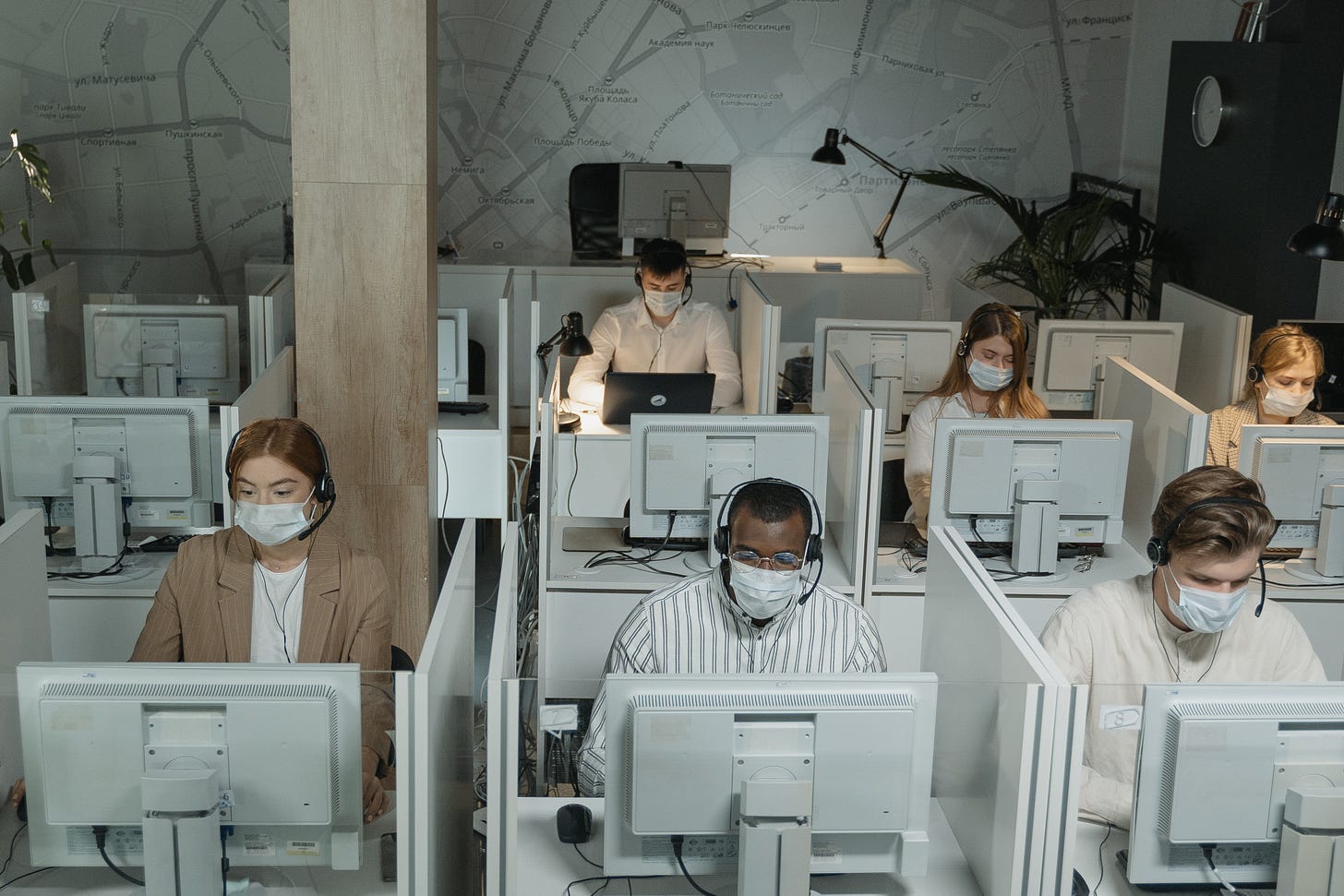Why Bosses Don’t Realize How Awful It Is to Work in an Office
Offices: great for managers, awful for everyone else
You may have noticed something about all of the articles discussing the “return to the office.” Guess who wants to return? The managers. According to a recent survey, 3 out of 4 executives want to return to the office—compared to only 1 in 3 workers. Managers are desperate to have workers return to the office, citing all kinds of reasons like “company culture,” “innovation,” and “team building.”
Free lunches, great coffee, and cozy chairs won’t fix what’s wrong with the experience of working in an office. First, as The Economist noted:
That points to another problem: many surveillance products aimed at boosting productivity are not well tested. Some risk being counterproductive. Research has associated monitoring with declines in trust and higher levels of stress, neither of which is obviously conducive to high performance. In one study of call centres, intensive monitoring of performance contributed to higher levels of strain, emotional exhaustion, depression and employee turnover. In a separate survey… over a third faced pressure to appear more productive or to work longer hours as a result of being monitored; a fifth felt dehumanised as a result.
It’s a pretty familiar list of symptoms to anyone who’s been in a highly regimented working environment:
Increased stress
Decreased trust
Strain
Emotional exhaustion
Depression
Turnover
Feelings of dehumanization
Working in an office can actually hurt your work.

Being controlled and watched hurts performance
I’m not saying that it always sucks for everyone to work in an office, but since organizations presumably want to get the best work out of people, here’s why they suck: in a classic study, ninety-five students were assigned to either the role of a superior or subordinate. Those assigned to be bosses would evaluate the work of the subordinates, who were told that their pay depended on their performance. (This study, in other words, mimicked the conditions of having a job.) Just feeling like they had power increased the bosses’ performance — and feeling like they lacked power, or being told that their pay was linked to performance, was a detriment to those subjects’ performance.
In another telling study, a group of researchers brought a group of three subjects in to complete a task hundreds of times.1 Every 20 trials, they received feedback about their relative performance relative to the others; the best player’s name was displayed on top next to three stars and a smiley face, and the worst had their name displayed next to a single star and a frown.
Whatever rank they had when there were 100 trials left was their rank for the rest of the experiment, allowing them some time to get used to their status.
Getting signals that our place in the group is precarious—that we’re not valued as much—puts us in a state of vigilance and hyperarousal, predisposing us to more inhibition-related behaviors because we don’t want to mess up. Having to follow all of these rules, and feeling like we might be criticized at any point, increases cognitive load.
Players with three stars reacted strongly to being correct, and showed subdued error-related signs when told that they’d made a mistake. Getting signs that you’re on the top gives you the mental luxury of being less concerned with your mistakes and perceiving fewer environmental constraints in your pursuit of rewards.
Getting signs that you’re on the top can make you oblivious to your mistakes and less empathetic to the emotional states of others.
Status cues change the brain
Plenty of social psychology is B.S., but the influence of status and stress is a universal, cutting across sociology, biology, and anthropology. We’re on equal footing at the grocery store or the park, but offices are built around these very status cues. Perceived social status affects our mortality, immune system, and the very functionality of our brain. Managers might not realize it, but every ounce of control—employee surveillance, micromanaging, and dictating language, clothing, environment, and hours worked—acts like a vacuum that sucks the motivation out of workers. Literally sucking the life out of us.
Meanwhile, at home: everyone’s squares on Zoom are the same size. Every email gets its own line.
Humans have a fundamental need for autonomy, to feel that we’re in control and doing things because we want to do them, not because we have to do them. You want to work for the great organization that respects its employees. But going back to the office is an invitation for managers to justify those arbitrary layers of control, on top of all the status cues that workers get about themselves—stress, on top of the stress of commuting, that adds to burnout.
It seems to be one of those times with a directly zero-sum outcome: for every extra bit of control and status cues shown by management, there’s a opposite effect on the workers.
How about this: I’ll go back to the office, but we’ll swap offices, salaries, and jobs. Doesn’t look so great now, does it?
Don’t be shy! I value feedback and love connecting with readers! hello@kstarr.com.
Thanks for reading! If you liked this, you can also sign up for a Medium account or forward it to someone who’d like it. I’m also on Twitter, Instagram, and LinkedIn. Article may contain affiliate links.
Boksem, Maarten AS, Evelien Kostermans, Branka Milivojevic, and David De Cremer. “Social status determines how we monitor and evaluate our performance.” Social cognitive and affective neuroscience 7, no. 3 (2012): 304-313.





